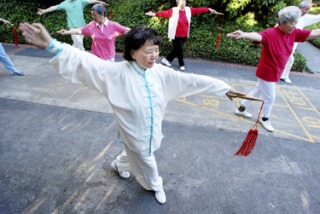Walk through the courtyard of Ellsworth House any evening at 7 p.m. and you’ll witness a sanctuary of Chinese culture.
With a lazy black cat sauntering around their feet, a dozen senior residents move gracefully through the archaic steps of tai chi. Traditional Chinese music softens the distant murmur of traffic. A trio of birch trees rustles in the wind. The courtyard is filled with calm.
“Tai chi is very good for the mind and the body,” said instructor Li Fung.
Ellsworth House, the Island’s only senior subsidized housing, hired Fung four years ago as a live-in translator for the center’s many Chinese-speaking residents. But the Mandarin and Cantonese Chinese translator has brought much more to the seniors of Ellsworth House, including the art of tai chi.
“It is very popular in China,” said Fung, who has practiced tai chi for 10 years. “And it’s growing in popularity here.”
Dating from the 12th century, tai chi is defined as an internal Chinese martial art. Its soft style, applied with internal power, distinguishes it from hard martial arts. With a multitude of traditional and modern forms, the art is practiced both competitively and as self-meditation, working toward health and longevity. The residents of Ellsworth House enjoy tai chi for the latter purpose.
“It’s a form of meditation, absolutely,” said resident Don Yates, who practices the Yang style of tai chi — different from that which Fung teaches — every morning. “It’s a big part of my life.”
Dressed in the traditional silk tai chi uniform with white shoes ordered from Korea to match, Yates’ skilled movements defy his 74 years. His arms move with graceful precision. His legs dance deftly across the ground. Often he uses a decorated Chinese sword, whisking it silently around his torso.
Watching him balance on one leg, it is hard to believe that Yates has undergone five years of treatment for prostate cancer.
“The tai chi has really helped me [cope with treatment] mentally. Physically, it’s too soon to tell,” he said.
Indeed, one of the benefits of tai chi is its healing power.
Research has shown that long-term tai chi practice can improve balance control, flexibility and cardiovascular fitness. Studies also show that it can reduce pain, stress and anxiety.
“Chi is energy. It’s a force that heals. When you’re adept, you can gather the energy and direct it, using the same pathways as acupuncture,” Yates said, explaining how he expunges “yesterday’s chi” out and circulates new energy in.
Yates first began studying tai chi under Mercer Island instructor Li Zhang, a world-class master who taught lessons through the Community Center.
“We’d practice at Luther Burbank sun, rain or snow,” Yates said.
When Zhang left the Island, moving to Connecticut with her husband, she asked Yates if he would take up teaching her class. Honored by the gesture, Yates was unable to take on the responsibility.
Yet he continued to practice the ancient martial art, in solitude mostly, every once and a while passing his knowledge on to others.
Jane Ditzler, another resident of Ellsworth House, has joined Yates during his morning tai chi exercises.
“I try to go as often as I can,” she said. “It’s very relaxing and wonderful exercise.”
Most of the Ellsworth residents who attend Fung’s evening tai chi classes are in their ‘70s. Those who are older and “can’t balance on one foot,” as Fung explained, practice their own set of slower exercises.
“The older group goes through movements that are good for the whole body; eyes, ears — even teeth,” the tai chi instructor said. “It’s very healthy for seniors.”
Hardly an evening goes by when the class does not meet in the quiet courtyard, nestled between a lush wall of foliage and well-kept rose garden.
“Our Chinese are particularly fond of this courtyard,” Yates said, adding that some 60 percent of the residents at Ellsworth House immigrated from China. “They bring their tradition here.”
When the weather is bad, the group moves inside to practice, according to Yates. Residents can often be found doing tai chi on their own.
In truth, the ancient martial art has become part of life at Ellsworth House. It has built community. It has strengthened culture.
And it has healed.



